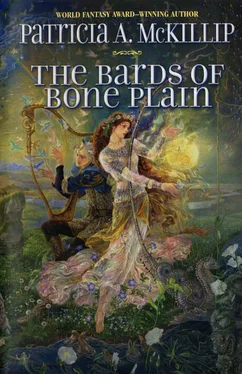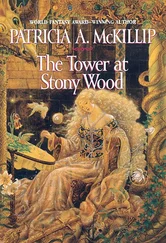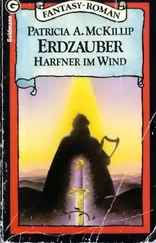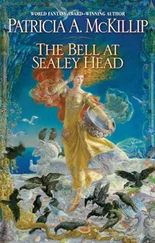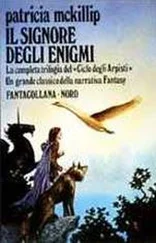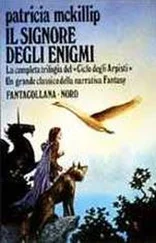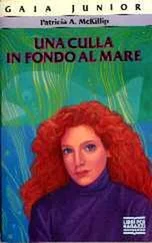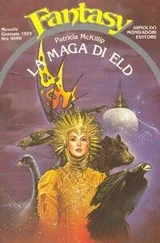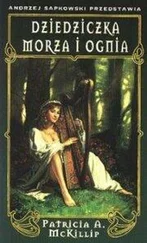“I’m not taking you in there,” he said adamantly. “It’s full of—”
“Wharf rats? I suppose that would be high on the list of things that would cause my mother to pack me off to the country. No matter—he’s coming back out.”
Windmilling back out, more precisely, Phelan thought, watching his father, on the next block, grappling at the air for balance as though he had been pushed out the door.
Luck held him upright, though a couple of passing dockers Jonah careened against were not so fortunate. They hauled themselves off the cobbles, cursing Jonah loudly. But he had already rounded the corner into a side street, and Phelan picked up his pace.
“There,” Princess Beatrice said quickly, as they took the turn onto the narrower, shadowy street in time to see Jonah walk through the gate of a low white picket fence without bothering to open it. “Well. There goes that herbaceous border. Is it an inn, or someone’s house?”
Phelan sighed, recognizing the bowed front windows fashioned from ovals of warped glass, the picturesque walls covered with neatly pruned ivy. “The Stonedancer Inn. They know my father. The last time I found him in there, he was sitting on the floor surrounded by the contents of an entire tea trolley, with potsherds on his shoulders and the lid on his head.”
“He’s going in—” The princess’s voice wobbled, steadied. “No. He’s going around the back.”
“Then we’ll go in the front. Meet him halfway.”
“But what would make him think that Kelda might be here?” the princess wondered, hurrying down the brick walkway after Phelan. “Kelda hardly knows his way around the castle, let alone the back streets of the Caerau waterfront. And why this prim little inn?”
Phelan opened the door. The proprietor had abandoned the quaint reception desk. Doors along the creaky hallway were closed. Painted hands on signs pointed the directions of The Breakfast Room, The Library, The Lounge. Phelan turned to follow that finger.
“Wait for me in the library?” he suggested to Princess Beatrice, who ignored him.
He opened the door to the lounge abruptly, glimpsed a round table full of shadowy people next to a huge old hearth, whose fire provided the only light in the room. Then he heard a familiar sound that grew too loud, too fast, filling his ears, then the room, like the formless bellow of something as old as the world that had erupted from its sleep to rage at him.
The sound flooded into him; he felt it vibrate through every bone in his body from skull to toe, and in that brief moment, he listened for the sound that his thrumming bones might make, astonished that there could be so many. Then he heard his father’s voice. The string that he had become keened and snapped, and he rattled down like a limp marionette onto the floor.
He opened his eyes a moment or a night later. From that angle, under the table, he saw the lounge’s back door hanging open on broken hinges. A pair of strange boots seemed to be arguing vehemently with a pair of familiar boots that were cracked with misadventure and old enough to have attracted a crust of barnacles. A third pair of shoes, pretty violet heels, came toward him, slowed, stood motionlessly for a moment at the table. He remembered them, and lifted his head dizzily to see the princess’s face.
She was staring at something on the table. Phelan heard her voice very clearly, somehow, beneath the escalating battle of voices belonging to the boots.
“The Circle of Days.”
Then her shoes spoke, coming toward him again, and he recognized the overwhelming sound that had driven into the marrow of his bones.
A single harp note.
The steward’s records indicate none of the problems that Declan surely faced as he tried to fashion a fair and organized competition with the unwieldy number of musicians at every level of ability on the plain. This was not, beyond the occasional request for lodging, a matter of accounts rendered or received. For such detail we must explore other chronicles, letters, and court records, and even the ballads that took root in those scant days. The bard of the Duke of Grishold complained to the duke’s chronicler of having, on that first day, to compete with “minstrels, street pipers, and others of such ilk,” along with several bards well educated in the courtly traditions. He is happier on the second day, after the rigors of the first pared away novices, dilettantes, street and tavern players, and those without the hope of a chance, who could play a cheerful tune or two, and mostly had just come to listen.
It is difficult for the city dweller to imagine what Stirl Plain must have looked like to those used to the lonely silent stretches of grass and standing stones. From “sunrise to moonset,” as one writer put it, the plain was covered with tents, wagons, campfires, pavilions, horses, oxen, dogs, with all the attendant noises, smells, colors. The school steward does list several of King Oroh’s nobles whom Declan invited to stay at the school. In various chronicles and private letters, they comment on the vivid crowd, the motley of musicians, and though, in the opinion of Lord Cleaver, King Oroh’s general and himself a musician, there are those “of great talent with their instruments, none seem trained in the necessary arts which King Oroh will expect of his bard, and which Declan brought with him to this benighted land.”
None except, perhaps, for an unusual harper.
This musician, of little charm, no wealth, and vague background, summons such art out of his simple harp that even the rich instruments of the high-court bards grow mute as he plays. Whence he comes he does not say, and his only name is Welkin.
FROM “ON STIRL PLAIN” VIRUH STAID, CHRONICLER TO THE DUKE OF GRISHOLD
By the end of the first day of the first bardic competition on Stirl Plain, one word fell from everyone’s lips like an enchanted jewel that contained the entire range of human feeling. Awe, disgust, envy, perplexity, suspicion, adoration, longing, curiosity, delight, and chagrin infused that single word; it changed every time it was spoken. That a craggy, threadbare, unknown musician with a battered harp, no family name or history, and only a vague direction as a place of origin, could render experienced court bards incoherent with his playing stunned everyone. On that first day, his name was most often followed by a more familiar word: Who?
Who was Welkin? Out of what nowhere had he come? Where had he learned to play like that? As though his harp were strung with the sinews of the heart, with sounds from the deep, shifting bones of the earth, with all the memories of music in the world before day ever opened its eye and night and time began?
Declan, moving through the crowds with his usual composure, confessed himself as ignorant as anyone of the harper’s past. Nairn, who had spent his life listening for such wonders, was transfixed by the harper’s skill until a skewed vision of Welkin dressed in leather and silk, riding at King Oroh’s side, counseling the king and using his magic at Oroh’s whim, bumped up against the homespun harper with the mysterious past, the glint in his eyes, and powers even Declan could only guess at.
Declan, only in private and only to Nairn, betrayed the one word that Welkin’s harping truly inspired in him.
“Do something,” he demanded of Nairn, when the contenders stopped to eat before they played the sun down.
“What exactly?” Nairn asked, disconcerted by Declan’s fear. “He plays better than I do.”
“Listen to him.”
“I do. I have been, all day. How could I not? He plays—he plays music the standing stones must have heard when they were new.”
Читать дальше
